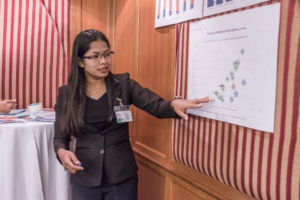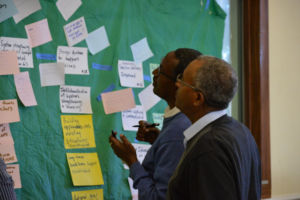USAID’s Sustainable WASH Systems (SWS) initiative brings together a consortium of researchers and practitioners to explore the application of systems approaches for more sustainable Water, Sanitation and Hygiene (WASH) interventions and service provision in a development context. As a member of the consortium, LINC is leading network analyses of WASH systems in Cambodia in partnership with local NGO WaterSHED, and Ethiopia with partners IRC and Tetra Tech. Baseline analyses in both countries were completed in fall 2017 for which LINC and our SWS partners have compiled two short research briefs outlining the methods and key insights from each assessment.

In Cambodia, LINC designed a network analysis to support WaterSHED’s efforts on a collective impact initiative in the Rural Sanitation and Hygiene (RuSH) subsector. The objective is to improve collaboration among national-level RuSH actors towards achieving the Cambodian Government’s ambitious 2025 vision. To understand the existing relationships between actors in the sector, LINC conducted an initial network analysis of 88 National RuSH organizations (INGOs, LNGOs, Government, Private Sector, and Academic Institutions). LINC and WaterSHED presented this initial snapshot to participants in the analysis at a consultative workshop in December 2017 to engage key actors and receive feedback on the data, findings, and potential opportunities for the network. Read More >>

In Ethiopia, LINC is working alongside partners IRC WASH and Tetra Tech to develop systems-strengthening interventions that will empower new, local “Learning Alliances” to take long-term ownership over strong WASH networks. As a foundational step, LINC conducted three Organizational Network Analyses (ONAs) among those WASH actors identified as potential Learning Alliance members in three respective locales: two districts (focused on rural water service delivery) and one small town (focused on urban sanitation services). LINC presented the initial findings at a kick-off meeting for the prospective Learning Alliances, which stimulated discussions around the most effective organizational structuring for each group to ensure maximum participation and equitability based on patterns of influence and connectivity identified in the analysis. Read More >>
One major takeaway from our engagements in both Cambodia and Ethiopia has been the existence of organizational clusters and subgroups within each network that have the potential to serve as strong models for coordination and foundations for collaborative efforts going forward.
We invite you to read the research briefs available here or at the links above to learn more about LINC’s work and the insights we’ve gained into these critical systems for community health. The Cambodia research brief is also available in Khmer on WaterSHED’s website here.
Please check back for the full baseline reports soon.
